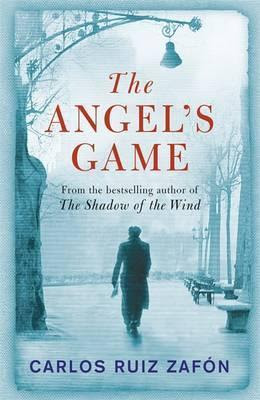Book #60
The Angel's Game by Carlos Ruiz Zafón
In an abandoned mansion at the heart of Barcelona, a young man, David Martin, makes his living by writing sensationalist novels under a pseudonym. The survivor of a troubled childhood, he has taken refuge in the world of books and spends his nights spinning baroque tales about the city’s underworld. But perhaps his dark imaginings are not as strange as they seem, for in a locked room deep within the house lie photographs and letters hinting at the mysterious death of the previous owner.Like a slow poison, the history of the place seeps into his bones as he struggles with an impossible love. Close to despair, David receives a letter from a reclusive French editor, Andreas Corelli, who makes him the offer of a lifetime. He is to write a book unlike anything that has ever existed — a book with the power to change hearts and minds. In return, he will receive a fortune, and perhaps more. But as David begins the work, he realizes that there is a connection between his haunting book and the shadows that surround his home.
Once again, into the Cemetery of Forgotten Books, and for what I can only describe as a prequel sequel. This time we journey with another struggling author. David Martin has been caught up in the machinations of an unsettling benefactor, a publisher whose existence cannot be proven, someone who seems to be linked to terrible events which begin to pepper David’s life.
It’s initially a disappointing move away from the beloved Sempere family; although they feature, it’s not as heavily as in The Shadow of the Wind. But as we experience David’s obstacles, and begin to understand him, it’s clear he’s beautifully crafted by Zafón, and his fate is tantamount to both the trajectory of the series, and to the Semperes.
In fact, there are a huge number of connections in this story to the others, sometimes subtle, sometimes not so much. It’s incredibly satisfying to recognise and interpret these nods to the previous novel, and to understand that some things are entirely synced in a way which is beyond our comprehension.
This feels somehow darker than The Shadow of the Wind, and the Barcelona gloom seems heavier, more oppressive. There’s a significant lack of hope, a bleak air, a dread, something almost supernatural. I enjoyed this shift in tone as Zafón displays his range of skill; his prose is delectable and arresting to me; it was gorgeous.
Although not quite as captivating as its predecessor, The Angel’s Game is an important installment in the series not just for its plot advancement, but for its contrasting tone and its constant offerings of comprehension and sense of belonging. You’re now involved in this intricate story, you’re part of the pages, and you must piece everything together for the characters, and for yourself.

